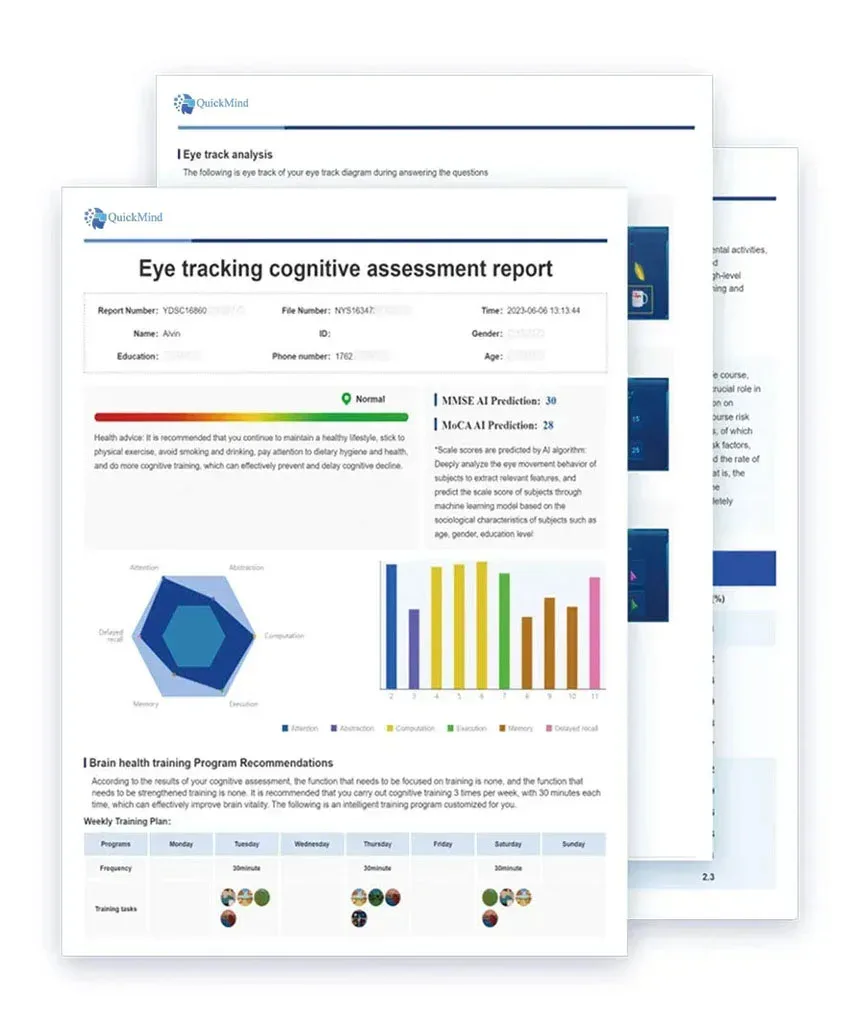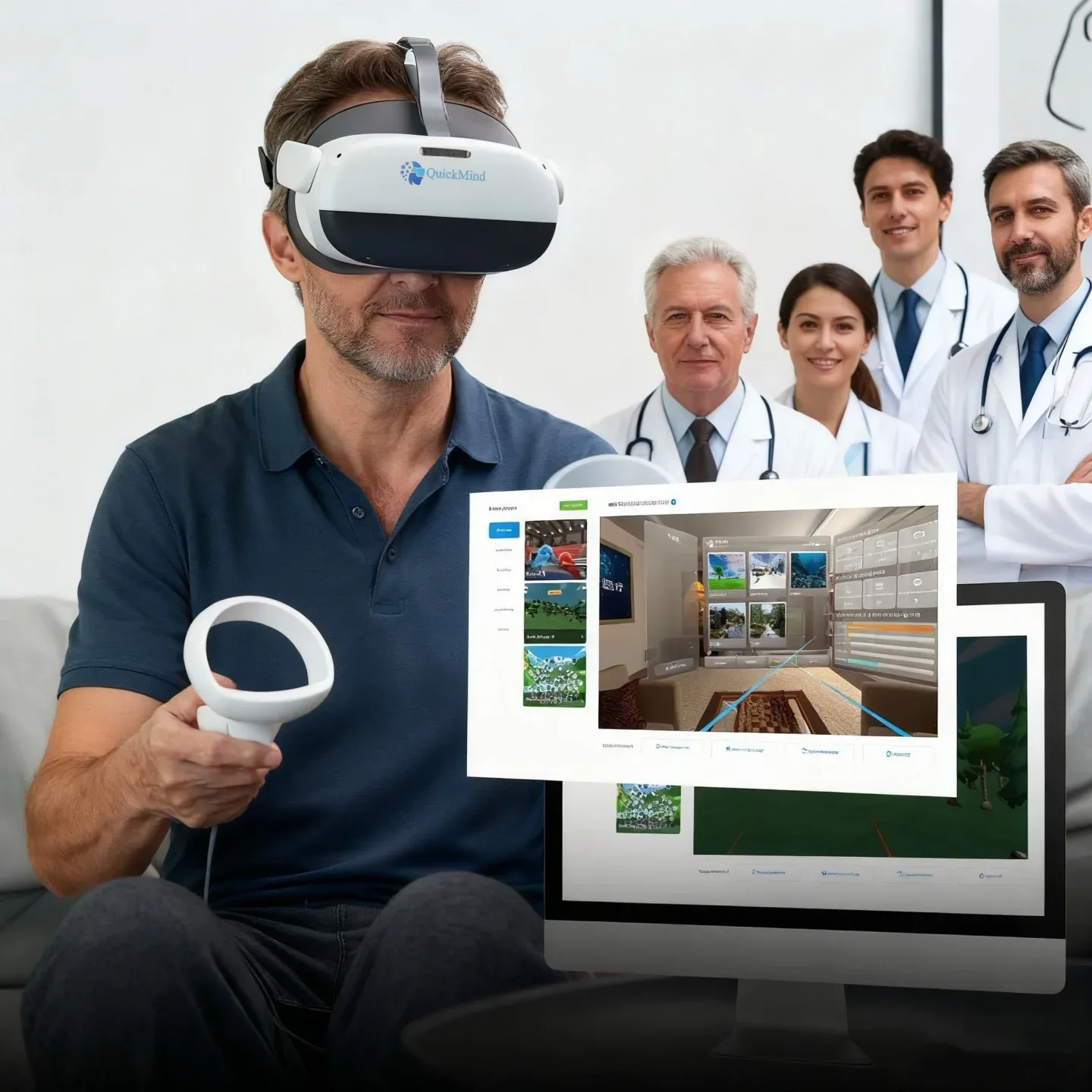
Growing research demonstrates that cyber environments treatment can profoundly advance the welfare of persons diagnosed with memory disorders. By conveying them to quiet atmospheres, VR presents a novel platform for cognitive stimulation, mood control, and socialization. Various investigations have shown that VR therapy can decrease distress, apprehension, and misery in dementia subjects while also refining their memorization, mindfulness, and linguistic talents.
- VR empowers subjects with dementia to revisit precious moments through collaborative emulations.
- What's more, it can allocate a safe and encouraging space for group interaction, encouraging a consciousness of attachment and affiliation.
- Researchers maintain that VR therapy has the prospect to remodel dementia management by yielding new and advanced avenues to tackle the intricate barriers faced by participants diagnosed with this ailment.
Innovative Tech Treatments for Alzheimer's
Expanding digital treatments are revealing effectiveness in the area of neural stimulation for clients struggling with Alzheimer's disease. These tools utilize technical resources to improve brain function and hypothetically impede the aggravation of the affliction. Immersive exercises, personalized support, and cognitive training are some demonstrations of tactics being examined in this dynamic discipline. While analyses are progressing, digital therapeutics afford a additional pathway for strengthening the experiences of those living with the Alzheimer's condition.Addressing Alzheimer's with Virtual Territory Journeys
Pertaining to individuals struggling with Alzheimer's dementia, the slow weakening of memory and thinking skills can substantially affect their power to socialize with the surrounding environment. This disabling malady often elicits in isolation, disorientation, and a lowered individuality. Contemporary refinements in virtual reality technology show a revolutionary chance to resolve these barriers by generating immersive landscapes that can stimulate the brain and rekindle cognitive function.
Computer-generated surroundings created specifically for Alzheimer's clients can carry them in comforting environments, such as their youthful dwelling or a preferred green space, evoking positive memories and mitigating anxiety. Through interactive missions, these virtual realms can also challenge cognitive abilities like mind retention, mindfulness, and logical processing.
The possible gains of virtual reality in Alzheimer's therapy are great. Early evaluations have demonstrated favorable results, with clients displaying improvements in cognitive performance, mood, and overall quality of life. As this mechanism evolves, it holds the key to transforming the way we approach Alzheimer's disease, due a new pathway for treatment and uplifting.
Virtual Memory Therapy for Alzheimer's Clients
Reminiscence therapy is an acknowledged technique used to boost cognitive function and affective health in individuals with Alzheimer's disease. This traditional form of therapy involves inviting patients to narrate past experiences, often through communication. However, a innovative approach is emerging: VR-mediated reminiscence therapy.
This immersive method utilizes virtual reality headsets to shift patients in simulated environments that invoke memories from their past. By reliving these man-made contexts, individuals with Alzheimer's can communicate with their past in a powerful way.
VR's Promise for Dementia Care: Enhancing Memory and Cognition
Virtual reality (VR) is emerging as a novel device in the fight against dementia, delivering modern ways to activate memory and cognition. By forming immersive experiences, VR can assist individuals with dementia revisit memories, interact in meaningful activities, and strengthen cognitive functions. Studies have proved that VR interventions can lead to important improvements in memory recall, attention, and dimensional awareness. Moreover, VR provides a harmless and uplifting space for individuals with dementia to explore, reducing feelings of isolation and stress.
- Additionally, VR can be configured to individual needs and preferences, supporting increased levels of involvement.
- Considering the potential of VR, extended research is needed to fully understand its long-term impact in dementia care.
Rekindling Memories, Rebuilding Connections: VR's Impact on Social Engagement in Alzheimer's Disease
Computer-generated synthetic settings is emerging as a innovative mechanism in the sphere of dementia care. By building engaging and responsive realities, VR has the ability to spark memories, promote social interaction, and increase the overall quality of life for people managing Alzheimer's. One of the most remarkable aspects of VR is its ability to shift users to recognizable spots and journeys from their past. Whether it's a excursion in a childhood home or a recreation of a beloved holiday, these virtual journeys can recall happy memories and bolster cognitive performance. Furthermore, VR can assist social interaction by joining individuals with others who share similar experiences. This can be particularly profitable for people with Alzheimer's who may deal with hardship with traditional social connection. By hosting a safe and interesting virtual space, VR can minimize feelings of isolation and loneliness, Alzheimer’s disease which are common among people living with Alzheimer's. Overall, VR holds immense power for innovating the lives of subjects with Alzheimer's by reawakening memories, reestablishing connections, and augmenting their quality of life. As technology keeps on expand, we can expect even more inventive applications of VR in the field of dementia care.Enhancing Cognitive Training: Implementing VR Techniques for Alzheimer's Aid
Digital virtual environments is rapidly emerging as a revolutionary tool in the realm of cognitive training, particularly for users affected by Alzheimer's disease. By immersing patients in interactive and engaging virtual environments, VR-based interventions can augment cognitive functions such as memory, attention, and problem-solving. These games regularly incorporate elements of storytelling, exploration, and social interaction, making the training process more enjoyable. Studies have shown that VR-based cognitive training can lead to pronounced improvements in cognitive performance, potentially delaying the progression of Alzheimer's symptoms. Moreover, VR provides a safe and controlled environment for patients to practice new skills and grow their confidence.
- Play-based techniques in VR training can make it more interactive and appealing for subjects with intellectual impairments.
- VR simulations can offer realistic scenarios that spur and energize cognitive functions.
- Personalized VR experiences can cater to individual needs and learning styles.
A Simulated Second Chance: Exploring the Benefits of VR Environments for Individuals with Dementia
Captivating artificial domains offer a modern and beneficial avenue for people affected by dementia. These platforms can transport familiar environments, allowing those affected by cognitive decline to experience cherished memories and promote a sense of comfort. By addressing the difficulties of dementia, VR contexts have the power to augment quality of life for both participants and their aides.
- Evaluations indicate that VR techniques can noticeably impact cognitive function, social well-being, and even motor abilities in individuals with dementia.
- Moreover, VR furnishes a safe and managed environment for interaction, reducing the risk of stress.
- What is more, VR can enhance social interactions by allowing individuals with dementia to socialize in online activities with others.
Virtual Reality for Prompt Alzheimer's Screening and Intervention
Alzheimer syndrome shows a challenging barrier, often continuing unnoticed in its early stages. Albeit, virtual reality (VR) is appearing as a advanced tool for precocious diagnosis. Through immersive digital replications, VR can evaluate cognitive performance in ways that traditional methods cannot cope to. This potential allows for quick response strategies, potentially reducing disease progression and elevating the quality of life for patients with Alzheimer's.
- VR platforms enable safe and monitored examination of memory, attention, and navigation abilities.
- Personalized VR experiences can help patients interact in activities that stimulate cognitive function.
- Immersive VR scenes foster connection and communication for Alzheimer's individuals.
Using Virtual Reality to Improve Linkages and Involvement in Dementia
{In the realm of dementia care, innovative technologies are emerging to enhance the lives of people affected by dementia. Virtual reality (VR) is one such tool that holds immense potential for reducing isolation through VR-mediated social and communicative support. By offering absorbing computer-generated environments, VR can invoke cognitive function, reduce behavioral issues, and ultimately improve the overall well-being of dementia patients.
VR experiences personalized for cognitive decline support can range from remembering therapy sessions that guide clients through remembered environments, to interactive games that promote social interaction and cognitive engagement. Furthermore, VR has the aptitude to connect subjects affected by dementia with companions, regardless of physical distance, fostering a sense of acceptance.
- VR can encourage in reducing agitation and anxiety by providing a calming and absorbing environment.
- Evaluations have shown that VR interventions can lead to improvements in cognitive function, mood, and social interaction in dementia patients.
- As technology develops in progress, we can expect even more innovative and productive
